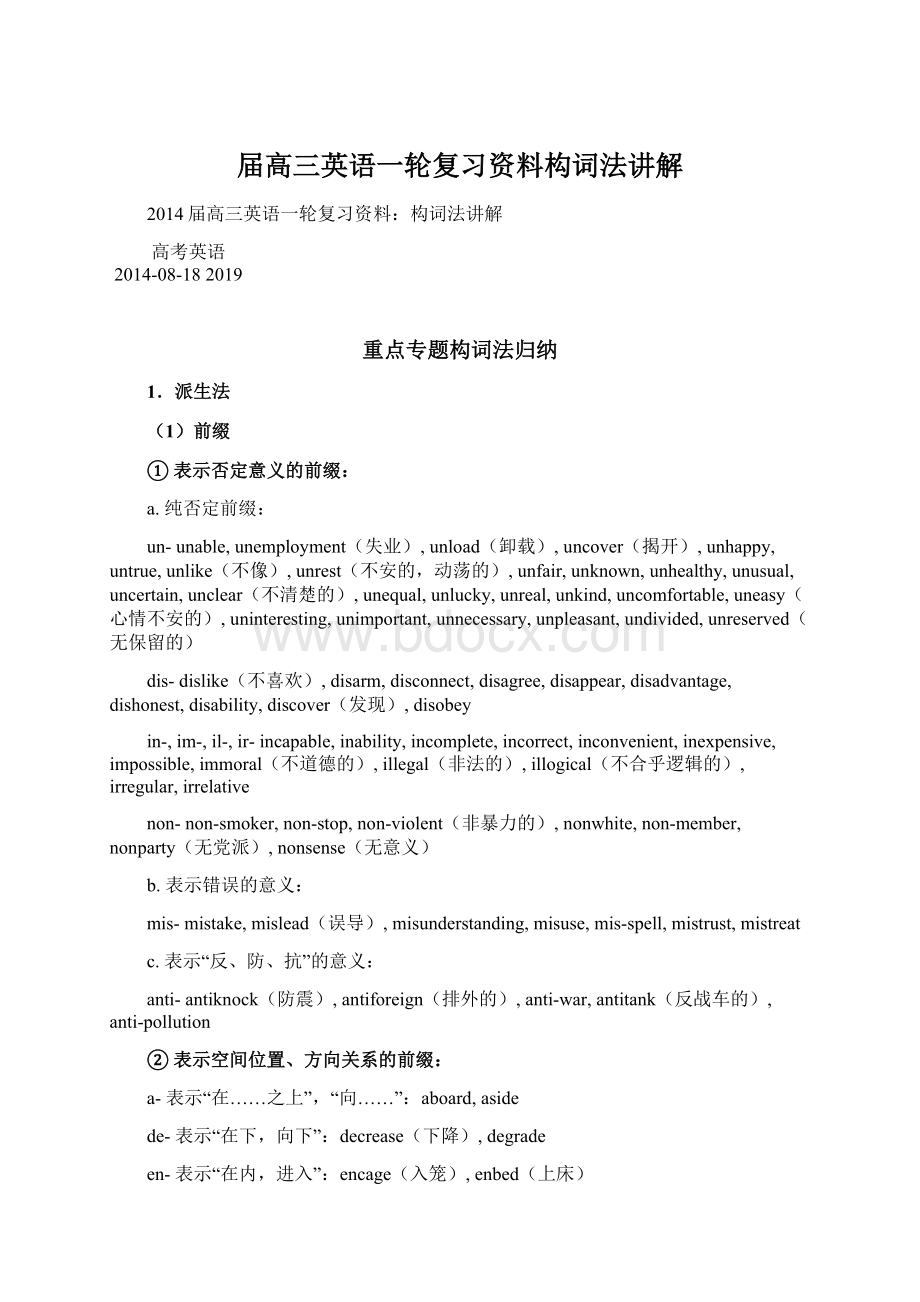届高三英语一轮复习资料构词法讲解.docx
《届高三英语一轮复习资料构词法讲解.docx》由会员分享,可在线阅读,更多相关《届高三英语一轮复习资料构词法讲解.docx(9页珍藏版)》请在冰豆网上搜索。

届高三英语一轮复习资料构词法讲解
2014届高三英语一轮复习资料:
构词法讲解
高考英语
2014-08-182019
重点专题构词法归纳
1.派生法
(1)前缀
①表示否定意义的前缀:
a.纯否定前缀:
un-unable,unemployment(失业),unload(卸载),uncover(揭开),unhappy,untrue,unlike(不像),unrest(不安的,动荡的),unfair,unknown,unhealthy,unusual,uncertain,unclear(不清楚的),unequal,unlucky,unreal,unkind,uncomfortable,uneasy(心情不安的),uninteresting,unimportant,unnecessary,unpleasant,undivided,unreserved(无保留的)
dis-dislike(不喜欢),disarm,disconnect,disagree,disappear,disadvantage,dishonest,disability,discover(发现),disobey
in-,im-,il-,ir-incapable,inability,incomplete,incorrect,inconvenient,inexpensive,impossible,immoral(不道德的),illegal(非法的),illogical(不合乎逻辑的),irregular,irrelative
non-non-smoker,non-stop,non-violent(非暴力的),nonwhite,non-member,nonparty(无党派),nonsense(无意义)
b.表示错误的意义:
mis-mistake,mislead(误导),misunderstanding,misuse,mis-spell,mistrust,mistreat
c.表示“反、防、抗”的意义:
anti-antiknock(防震),antiforeign(排外的),anti-war,antitank(反战车的),anti-pollution
②表示空间位置、方向关系的前缀:
a-表示“在……之上”,“向……”:
aboard,aside
de-表示“在下,向下”:
decrease(下降),degrade
en-表示“在内,进入”:
encage(入笼),enbed(上床)
ex-表示“外部,外”:
exit,expand(扩张),export
fore-表示“在前面”:
forehead,foreground,foreleg,forefoot
in-,im-表示“向内,在内,背于”:
inland,inside,indoor(s),import
inter-表示“在……间,相互”:
international,interaction,internet,interview
mid-表示“中,中间”:
midposition
out-表示“在外部,在外”:
outline,outside,outward(s),outdoor(s)
over-表示“在上面,在外部,向上”:
overlook,overhead,overboard,overcoat,overdress,oversea(s)(海外)
post-表示“向后,在后边,次”:
postscript(附言)
pre-表示“在前,在前面,提前”:
prefix(前缀),preface(前言),preposition(介词)
super-表示“在…..之上,超级”:
superstructure,supernatural,superpower,superman
trans-表示“移上,转上,在那一边”:
translate,transform(转移),transplant(移植),transportation(交通)
under-表示“在…..下面,下的”:
underline,underground,underwater,undershirt
up-表示“向上,向上面,在上”:
upward(s),uphold,uphill(上坡)
auto-表示“自己,独立,自动”:
automobile(自动车),autobiography(自传)
tele-表示“远离”:
television,telephone,telegram(电报),telegraph(电报,抽象名词),telescope(望远镜)
③表示时间,序列关系的前缀:
fore-表示“在前面,先前,前面”:
foreword(前言),forecast(预报),foretell(预言),foresee(预见),foreknow(先知),foreknowledge(先知)
mid-表示“中,中间”:
midnight,midsummer,mid-day,mid-autumn
post-表示“在后,后”:
postwar,postgraduate(研究生),postdate
pre-表示“在前,事先,预先”:
preheat,prewar,prehistory(史前),preview(预习),prebattle,prepay
re-表示“再一次,重新”:
retell(复述),rewrite,renew(续借),reconsider,reuse,remarry,recycle(回收利用),rebuild
④表示比较程度差别关系的前缀:
by-表示“副,次要的”:
byproduct(副产品),bywork(副业)
extra-表示“超越,额外”:
extraordinary
over-表示“超过,过度,太”:
overeat(吃过多),oversleep(睡过头),overpraise(过奖),overwork,overact(行为过分),overdo
under-表示“低劣,低下”:
undersize,undergrown,underproduction(生产不足)
vice-表示“副,次”:
vice-president,vice-chairman
⑤表示共同,相等意思的前缀:
co-表示“共同,一起”:
coexist(共同生存),co-operate,co-worker,coactions(合作行动),coauthor(合作)
⑥表示某种状态,构成形容词、副词或动词:
a-afraid,alive,alone,asleep,ashamed,aloud,ahead,aside,alike,awake
⑦表示分离,离开意思的前缀:
a-表示“分离,离开”:
away,apart
de-表示“离去,处去”:
depart,decolour
⑧表示“自我”:
self-self-protect(ion),self-made,self-knowledge
⑨表示变换词类作用的前缀:
be-befriend
en-enslave,enable,enrich,enlarge,encourage
⑩表示数量关系的前缀:
a.表示“单一”,“一”:
uni-uniform(统一服装),unicellular(单细胞)
b.表示“二,两,双”:
bi-bicycle
twi-twilight
c.表示“半,一半”:
semi-semiconductor(半导体),semicircle(半圆),semimonthly(半月刊),semifinal(半决赛)
d.表示“百,百分之一”:
centi-centimeter
e.表示“千,千分之一”:
kilo-kilometer,kilogram,kilowatt
f.表示“微小”:
micro-microvolt(微伏特),microcomputer(微机),microscope(显微镜)
g.表示“许多,复,多数”:
multi-multimedia(多媒体),multicolored,multiform,multinatural
h.表示“千分之一、毫”:
milli-millimeter,milligram
i.表示“微小、微型”:
mini-minibus,miniskirt,minipark
(2)后缀
①名词后缀:
a.具有某种职业或动作的人:
-an,-ian,-ician表示“……地方的人,精通……的人”:
American,Asian,Australian,Russian,Italian,historian,librarian,electrician,magician(魔术师),technician,musician,politician(政客),physician(内科医生),
-ant,-ent 表示“……人”:
merchant,servant,assistant,agent,student,
-ee表示“动作承受者”:
employee(雇员),examinee,payee(收款人),interviewee
-eer表示“从事于……人”:
engineer,volunteer(志愿者)
-er表示“从事某种职业的人,某地区,地方的人”:
banker,observer,Londoner,villagersinger,driver,writer,speaker,traveller,buyer
-or表示“……者”:
author,doctor,operator,actor,visitor,inventor,educator
-ar,-ary 表示“……的人,从事……的人”:
scholar,liar,beggar,secretary,missionary
-ese表示“……国人,……地方的人”:
Chinese,Japanese,Cantonese(广东人)
-ess表示“阴性人称名词”:
actress(女演员),hostess(女主人),manageress(女经理)
-ist表示“从事……研究者,信仰……主义者”:
pianist,communist,dentist,artist,chemist,socialist,typist,receptionist
-icist表示“……家,……者,……能手”:
physicist,phoneticist(语音学家),technicist
-logist表示“……学家,研究者”:
biologist,geologist(地质学家)
b.构成具有抽象名词的含义:
-age表示“状态,行为,身份及其结果,总称”:
courage,storage,marriage,percentage
-al表示“事物的动作,过程”:
refusal,arrival,survival,denial,approval,trial,burial
-ance,-ence表示“性质,状况,行为,过程,总量,程度”:
importance,distance,avoidance,appearance,performance,diligence,difference,obedience,absence,presence(出席),existence
-ancy,-ency表示“性质,状态,行为,过程”:
frequency(频繁),urgency(紧急),efficiency(高效率),
-ity表示“性质,状态,程度”:
purity,reality,equality
-bility表示“动作,性质,状态”:
ability,possibility,probability,responsibility
-dom表示“等级,领域,状态”:
freedom,kingdom,wisdom
-ery,-ry表示“行为,状态,习性,性质”:
bravery,slavery
-hood表示“资格,身份,年纪,状态”:
childhood,girlhood,boyhood,manhood
-ice表示“行为,性质,状态”:
notice,justice,service
-ing表示“动作的过程,结果”:
building,writing,learning
-ion,-ation,-ition,-sion表示“行为的过程,结果,状况”:
suggestion,action,solution,invention,direction,correction,collection,instruction,destruction,introduction,congratulation,dictation,invitation,pronunciation,examination,graduation,operation,education,information,translation,starvation,satisfaction,relation,irrigation,determination,preparation,imagination,explanation,opposition,competition,description,decision,division,conclusion,explosion,impression,expression_r,admission,permission,discussion
-ment表示“行为,状态,过程,手段及其结果”:
disappointment,treatment,movement,judgment,punishment,argument,agreement,government,development,improvement,requirement,astonishment,encouragement
-ness表示“性质,状态,程度”:
goodness,kindness,tiredness,friendliness,business,illness,happiness,goodness,willingness,weakness,fairness
-ism表示“制度,主义,学说,信仰,行为”:
socialism,criticism,heroism,tourism,communism(共产主义),Marxism(马克思主义)
-ship表示“情况,性质,技巧,技能及身份,职业”:
hardship,relationship,membership,friendship,seamanship,ownership,scholarship,professorship
-th,表示“动作,性质,过程,状态”:
strength,length,width,depth,wealth,truth,growth,warmth,youth
-ure表示“行为,结果”:
exposure(暴露),pressure,failure,procedure(手续),mixture
-craft 表示“工艺”:
aircraft,needlecraft,woodcraft
c.带有场所,地方的含义:
-age表示“住所,地点”:
village,cottage
-ary表示“住所,场地”:
library,granary(谷仓)
-ory表示“工作场所,住处”:
factory,dormitory,laboratory,observatory
②形容词后缀:
a.带有“属性,倾向,相关”的含义:
-able,-iblemovable,comfortable,eatable,enjoyable,acceptable,reasonable,applicable,visible,responsible,terrible,horrible
-alnatural,additional,educational,national
-ant,-entdistant,important,excellent
-ing(表示特征:
令人觉得)moving,touching,daring,interesting,exciting,disappointing,astonishing,boring,amazing
-ed(表示情绪:
觉得)pleased,interested,surprised,worried,excited,bored,determined,delighted
-ishfoolish,bookish,selfish
-iveactive,impressive,decisive,active,instructive,expensive,progressive
b.表示“相象,类似”的含义:
-ishboyish,childish
-likemanlike,childlike
-sometroublesome,handsome
-ymilky,cloudysunny,windy,rainy,foggy,healthy,wealthy,worthy,bloody,funny,dirty,lucky,noisy,salty,smelly,hilly
-lymanly,fatherly,motherly,sisterly,brotherly,daily,weekly,monthly,quarterly,yearly,friendly,lonely,orderly,lovely,lively,likely,scholarly
c.表示“充分的”含义:
-fulbeautiful,wonderful,helpful,truthful,successful,harmful,useful,careful,forgetful,merciful
-ousdangerous,courageous,nervous,mountainous,humorous,various
d.表示由某种物质形成,制成或生产的含义:
-enwooden,golden,woolen
e.表示方向的含义:
-erneastern,western,southern,northern,southeastern,northwestern
-warddownward,forward
f.表示“数量关系”的含义:
-teenthirteen
-tyfifty
-thfourth,fiftieth
g.表示国籍,语种,宗教的含义:
-anRoman,European
-eseChinese,Japanese
-ishEnglish,Spanish
h.表示否定:
-lesscountless,stainless(不锈的),wireless,useless,endless,priceless(无价的,贵重的),hopeless
③动词后缀:
-ize,ise表示“做成,变成,……化”:
modernize(现代化),democratize(民主化),organize,apologize,realize
-en表示“使成为,引起,使有”:
quicken,weaken,soften,harden
-fy表示“使……化,使成”:
beautify,purify(净化),intensify,signify,simplify(简化),satisfy
④副词后缀:
-lypossibly,swiftly,simply
-ward(s)downward,inwards,upward
-waysalways,sideways
-wiseotherwise,clockwise
注意:
有的单词有双重后缀,如:
use(用途)→useless(无用的)→uselessness(无用)
self(自己)→selfish(自私的)→selfishness(自私)
有的单词则是前后缀同时使用,如:
important→importance→unimportance
regular(有规律的,有规则的)→irregular(无规律的,不规则的)→irregularity(无规律,不规则)
2.合成法
(1)合成名词
boyfriend,girlfriend,bus-driver,necklace,playground,radioactive,headmaster,sunshine,notebook,armchair,wheelchair,postcard,football,spaceship,blackboard,firefighter,fireman,gateman,chairman,weatherman,businessman,armyman,postman,sportsman,bedroom,reading-room,classroom,newspaper,pickpocket(扒手),she-goat(雌性山羊),editor-in-chief(主编),daybreak(破晓),handshake(握手),silkworm(蚕),outbreak(爆发)
(2)合成形容词
名词+动词过去分词:
man-made,homemade
副词+动词过去分词:
well-known,newly-built(新建的)
形容词+名词ed:
kind-hearted,cold-blooded
数词+名词ed:
five-storeyed(五层楼的),four-legged(四条腿的)
名词+动词现在分词:
English-speaking,Chinese-speaking,brainwashing(洗脑的)
由三个词构成的合成形容词:
face-to-face,heart-to-heart,two-year-old,eight-metre-long
其他合成形容词:
everyday(日常的),faraway(遥远的),snow-white(雪白的),lay-off(下岗的)
3.转化法
(1)名词→动词
hand(手→传递) back(背部,后面→支持,后退)
charge(费用→收费) copy(抄本,复印件→抄写,复印)
flood(洪水→淹